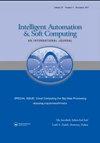Dynamic Sliding Mode Backstepping Control for Vertical Magnetic Bearing System
IF 2
4区 计算机科学
Q2 Computer Science
引用次数: 2
Abstract
Electromagnets are commonly used as support for machine components and parts in magnetic bearing systems (MBSs). Compared with conventional mechanical bearings, the magnetic bearings have less noise, friction, and vibration, but the magnetic force has a highly nonlinear relationship with the control current and the air gap. This research presents a dynamic sliding mode backstepping control (DSMBC) designed to track the height position of modeless vertical MBS. Because MBS is nonlinear with model uncertainty, the design of estimator should be able to solve the lumped uncertainty. The proposed DSMBC controller can not only stabilize the nonlinear system under mismatched uncertainties, but also provide smooth control effort. The Lyapunov stability criterion and adaptive laws are derived to guarantee the convergence. The adaptive scheme that may be used to adjust the parameter vector is obtained, so the asymptotic stability of the developed system can be guaranteed. The backstepping algorithm is used to design the control system, and the stability and robustness of the MBS system are evaluated. Two position trajectories are considered to evaluate the proposed method. The experimental results show that the DSMBC method can improve the root mean square error (RMSE) by 29.94% compared with the traditional adaptive backstepping controller method under different position tracking conditions.垂直磁轴承系统的动态滑模反步控制
在磁轴承系统(mbs)中,电磁铁通常用作机械部件和零件的支撑。与常规机械轴承相比,磁轴承具有较小的噪声、摩擦和振动,但磁力与控制电流和气隙具有高度非线性关系。针对非模态垂直MBS的高度位置跟踪问题,提出了一种动态滑模反演控制方法。由于MBS是非线性的,具有模型不确定性,估计器的设计必须能够解决集总不确定性。所提出的DSMBC控制器不仅能稳定失匹配不确定性下的非线性系统,而且能提供平滑的控制效果。导出了Lyapunov稳定性判据和自适应律以保证收敛性。得到了可用于调整参数矢量的自适应方案,从而保证了系统的渐近稳定性。采用反步算法设计控制系统,并对MBS系统的稳定性和鲁棒性进行了评价。考虑了两个位置轨迹来评估所提出的方法。实验结果表明,在不同的位置跟踪条件下,与传统的自适应反步控制方法相比,DSMBC方法的均方根误差(RMSE)提高了29.94%。
本文章由计算机程序翻译,如有差异,请以英文原文为准。
求助全文
约1分钟内获得全文
求助全文
来源期刊

Intelligent Automation and Soft Computing
工程技术-计算机:人工智能
CiteScore
3.50
自引率
10.00%
发文量
429
审稿时长
10.8 months
期刊介绍:
An International Journal seeks to provide a common forum for the dissemination of accurate results about the world of intelligent automation, artificial intelligence, computer science, control, intelligent data science, modeling and systems engineering. It is intended that the articles published in the journal will encompass both the short and the long term effects of soft computing and other related fields such as robotics, control, computer, vision, speech recognition, pattern recognition, data mining, big data, data analytics, machine intelligence, cyber security and deep learning. It further hopes it will address the existing and emerging relationships between automation, systems engineering, system of systems engineering and soft computing. The journal will publish original and survey papers on artificial intelligence, intelligent automation and computer engineering with an emphasis on current and potential applications of soft computing. It will have a broad interest in all engineering disciplines, computer science, and related technological fields such as medicine, biology operations research, technology management, agriculture and information technology.
 求助内容:
求助内容: 应助结果提醒方式:
应助结果提醒方式:


